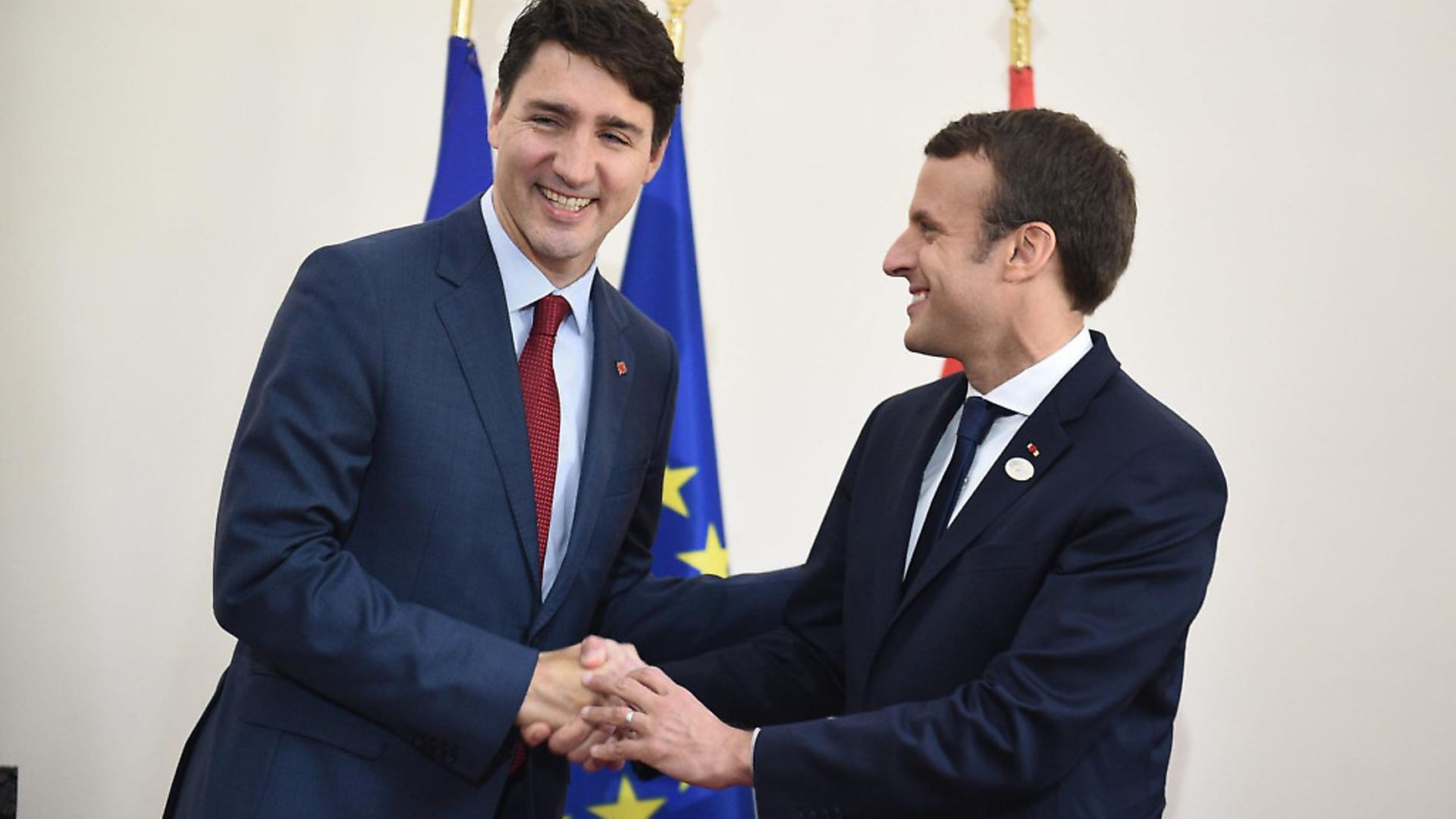
Progressives expect great things from Emmanuel Macron and Justin Trudeau. But can the telegenic leaders actually deliver, asks Paul Knott.
Handsome, charismatic, liberal and francophone. French President Emmanuel Macron and Canadian Prime Minister Justin Trudeau could be caricatures of a New European reader’s dream political leader.
Critics with different perspectives have dismissed the duo as representing style over substance. But their early records in power challenge this lazy categorisation. Both are beginning to fulfil the highest hopes invested in them by progressives, by leading the world out of an era of nastiness and insularity.
Trudeau and Macron’s greatest asset is the considerable soft power they pack. They make a powerful case for openness and internationalism, while overtly positioning themselves as the antidotes to far-right populism.
Rather than pandering to bigots or attempting to mollify them, both leaders show a bold determination to take them on in public debate. By politely but firmly deploying reasoned arguments, they invariably emerge triumphant too.
Macron’s calm and steely dismantling of Marine Le Pen’s prejudices in their head-to-head debate during the French presidential election remains a masterclass. Le Pen has yet to recover and may never do so.
As the president of France, Macron has access to more obvious hard power than his Canadian counterpart. His country is a leading member of the European Union and has one of the five permanent seats on the United Nations Security Council.
Canada is often seen by outsiders as a kinder, gentler version of the United States. This view is condescending and doubtless offensive to both countries. But it is not entirely without foundation, given their shared North American location, Canada’s all-embracing ‘Medicare’ public health system and its citizens’ relative lack of enthusiasm for gun crime.
In reality, of course, Canada has its own distinct culture and way of doing things. Notably in the current political climate, it has a well-thought out and successful system for attracting and integrating immigrants. The ongoing influx of capable and hardworking newcomers constantly regenerates the country’s cultural and economic dynamism.
Canada’s international clout is less obvious. It has a smaller population than France (35 million compared to 66 million) and a less pivotal geographical location. But its long history of active engagement in NATO, the G7 and at the UN gives it considerable global influence.
In terms of attracting attention to Canada, Trudeau is a chip off the old block. His father, Pierre, was his best-known predecessor as Canadian PM. During his premiership stints in the 1960s, ’70s and ’80s, the magnetic Trudeau senior dramatically raised Canada’s profile. Many Canadians credit him with bringing their country out of the shadows cast by its overbearing American neighbour and the former colonial power, Britain.
When he was a student, Pierre Trudeau posted the words ‘Citizen of the World’ on his door. The Canadian novelist, Nino Ricci, notes how the elder Trudeau used his subsequent political career to ‘turn these words into the essence of being Canadian, not the negation of it’.
Justin Trudeau follows firmly in these footsteps. He unfailingly emphasises Canada’s positive identity as a vibrant, multi-cultural nation of immigrants. He has even been known to welcome new arrivals personally at the airport.
Macron and Trudeau both favour giving straight answers to straight questions. This approach ought to be unremarkable. But it stands out because of its rarity in contemporary politics. It is a habit that is certainly in tune with the public mood. As Theresa May’s 2017 car crash of a British election campaign illustrated, people are sick of empty soundbites and can spot evasiveness a mile away.
The voters now appear to prefer politicians with clear convictions and a willingness to express them, even if they do not always fully agree with them.
Even so, impressive presentation and persuasive abilities are not enough. Both Macron and Trudeau are backing their words up with action.
Macron has combined his political capital with smart negotiating skills to obtain the support of some of the unions for his economic reforms. As a result, he has arguably brought about more change in France in the past year than was achieved during the entire previous decade. Whilst other countries are closing in on themselves, Macron’s passionate advocacy of openness to the world is boosting inward investment into France. The big test for him now is to ensure that it brings jobs and more equitably distributed prosperity with it.
Trudeau has been equally bold in bucking the nativist trend against international trade and cooperation. He responded to Trump’s torpedoing of the massive Trans-Pacific Partnership (TPP) trade agreement by working with his Asian counterparts to develop an alternative to it, to be known as the Comprehensive and Progressive TPP.
Trudeau seems to be on the way to outfoxing the Trump administration again over the North American Free Trade Agreement (NAFTA). After standing up to Trump with his strong defence of the agreement, Trudeau is now proposing a compromise reform of it. The changes involved would be mainly cosmetic and a far cry from the obliteration of the deal that Trump has long blustered about.
Perhaps most crucially, Macron and Trudeau appear to understand what is required for openness and internationalism to succeed. They recognise that the insecurity globalisation has generated for many people will only be assuaged if they feel their lives directly benefit from it.
In recent speeches, Trudeau has stated bluntly that the aggressive capitalist malpractices of tax-dodging and personal greed by bosses are no longer acceptable. In doing so, he has directly challenged other political and business leaders to join him in making globalisation work for everyone.
Trudeau and Macron’s ideas and approaches provide a model for progressives all over the world to follow. Given the dangerous nationalist alternatives that have sprung up over recent years, the stakes on their success could hardly be higher.









